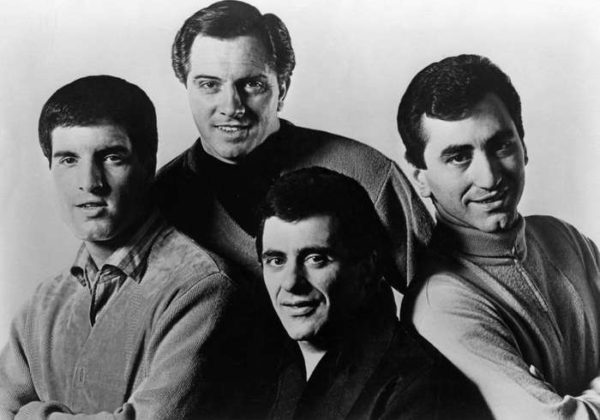
Silence is golden
When I was at primary school, the teachers would play the same piece of music every week when we were filing into the school hall for assemblies. Every time I hear this song now, I’m transported back to the late 1980s and for a few seconds I feel like the little girl I once was, wearing my navy blue school uniform, purposely pressing my lips closed so that none of my teachers thought I was misinterpreting the message of the lyrics.
The song in question was “Silence is Golden” by Frankie Valli & the Four Seasons and I have no doubt the teachers knew exactly what they were not-so-subtly telling us every time they pressed play on the cassette player.
I’m sure this was their message: ‘You have to be quiet so you can hear what’s being said to you.’
When the UK government first announced the nationwide Coronavirus lock down on March 23rd 2020, everything changed overnight. Non-essential shops, pubs, restaurants, cinemas and theatres closed their doors, many businesses ceased operating and places of worship, including churches, were forced to cease gathering physically. In the first few days following the lockdown, I think most of us went into shock and everything felt very quiet. There were no more church meetings to attend, no more work meetings to attend, no school runs to do, no long car journeys to make and nowhere to go at all. The streets were deserted. Silence seemed to be the order of the day.
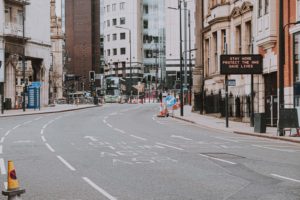
But it didn’t last long.
While the streets outside may have remained deserted and quiet, the information superhighway that is the internet has gradually become so clogged with traffic that the noise has become deafening. Some websites are so busy, there is a queue to even access them. My sister-in-law waited for two hours last week to get on to the Ocado website to book her online shop!
Alongside the digital noise, the activity inside millions of homes around the world has also been anything but quiet.
In the days that followed the PM’s announcement, thousands of families’ lives changed dramatically and The Wildsmith clan were no exception. Both our 6-year old son’s school and our 3-year old son’s childminder closed their doors, leaving my husband and I to look after them both 24-7. Since we both work and our jobs still needed to be done, working-from-home became the order of the day and, as millions of families across the globe have discovered, working from home with children around is not an easy task! My friends have shared many hilarious tales with me of the ways in which their children have “photo-bombed” their parents’ video-conference calls. My favourite still remains when the 4-year old daughter of one of my pals stood behind her mother’s shoulder whilst on a conference call with her entire staff team and started to take all of her clothes off, unbeknownst to her mum!
The pressure continued to mount when we started to factor in how we were going to squeeze all of our work hours into each day whilst simultaneously home-schooling our eldest and entertaining our youngest. Finally, adding in the most obvious change of us not being able to take them anywhere, and we had ourselves a recipe for stressful, noisy disaster!
So, in order to cope, alongside good old-fashioned books, pens and paper, the internet became the go-to place for help and ideas.
We discovered Joe Wicks and his popular YouTube channel could teach both of our sons PE every morning and that the school’s website was home to many useful ideas for lesson plans and activities. The Hamilton Trust provided us with free downloadable weekly maths and English worksheets and BBC Bitesize has helped teach our son about the Geography of the British Isles and the oceans of the world.
We’ve learned the French names of numerous fruits and vegetables, learned how to make edible mud for our toy farm animals to play in, painted rainbows for our windows and made chalk drawings on our driveway. We’ve managed to write to our MP Gavin Williamson to implore him to “make electric cars cheaper so that we can stop climate change” (he hasn’t written back yet, shock horror!), and we’ve created a homemade worm hotel for our garden residents. On one particularly rainy day, we even resorted to letting the kids throw handfuls of porridge oats around the kitchen in a makeshift indoor sandpit. Desperate times call for desperate measures!
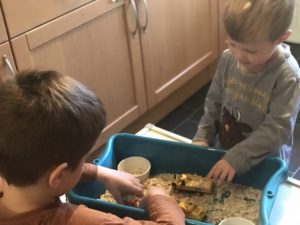
But the content and help hasn’t ended there.
About a week into lock down, the invitations to join Facebook groups started to emerge. One group called “How to home-school your kids in isolation when you have absolutely no clue what you’re doing” remains a personal favourite of mine and is crammed full of other people’s clever ideas to occupy teach their kids! I’ve thus far managed to avoid looking on Pinterest for ideas – it always makes me feel utterly inept. I’ll never be a Pinterest Mom. I have zero interest in making unicorns out of old toilet rolls and neither do my children – but we’ve visited google more times than I care to remember to try to find ways to manage this crazy situation.
We have been bombarded, almost every minute of the day, with ideas and encouragement and solutions to survive this lock down. And it’s not just coming from the educators.
BBC News updates regularly flash up on our phones, reminding us to wash our hands and stay home. Radio Five Live appears to speak about nothing else but COVID-19. Even Gogglebox is full of it!
And now churches have gone online too and are playing their part in helping people to remain encouraged and hopeful through this awful time in our nation’s history. Online services, Zoom prayer meetings, virtual life groups, local prayer meetings, prayer for the NHS, prayer for the nation, prayer for the PM, worship-montages, Facebook live, YouTube premieres, WhatsApp groups (hundreds of them!), Facebook groups, Facetime calls, emails and text messages have added to a situation that has become absolutely overwhelming at times. Well, for me at least and therefore I’m sure for many others out there.
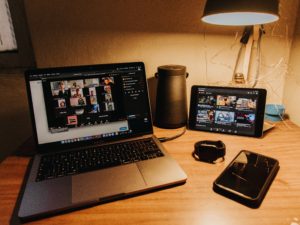
I realise that not everyone’s lock down experience has been as hectic as ours and that for some people, the online content has been a welcome and crucial distraction from the isolation and loneliness. Church is fundamentally a community of believers and therefore maintaining contact is right and good. But for many more millions of people, the constant bombardment of social media has become overwhelming and the result has been one of relentless digital NOISE.
This is true whether we live in a crowded house full of cabin-fevered children or whether we are completely on our own during this lockdown. The information at our fingertips quickly turns itself into noise walking circles through our minds to rob us of our peace.
And I’ve found the noise manifests itself in several ways.
Firstly fear.
Fear is something that has gripped our nation through the Coronavirus pandemic. Fear is a noise that’s hard to escape because the news headlines are 24-7. Many of us during this time are feeling really, genuinely scared. It might be because we fall into the “high-risk” category due to our age or medical history and every time we turn on the TV, we’re reminded just how at risk we are and how many new people have that died that day. Or we might have members of our family who are high risk and the fear that something might happen to them is an overwhelming noise that dominates our minds. I know of lots of people who are too scared to even leave the house and when all we hear is that this situation could last months and months, the fear of that prospect can be crippling.
Another noise we can be facing right now is pressure.
The pressure to hold down our jobs whilst trying to look after our families and work from home is certainly one my family is familiar with right now. We don’t want to let our employers down but we’re finding it so hard to get the hours in with the age that our kids are – the kids need us but the work emails never stop coming in. The alert noises on our phones and laptops keep on beeping from morning till night and that noise creates a constant pressure to keep performing and keep delivering despite everything.
Many people reading this have been furloughed from their jobs and that brings a pressure all of its own. News headlines flash up on our phones telling us how badly the economy is coping. And those alerts create pressure. How will I cope financially? How long will the furlough last? What if there’s no job to go back to? How will I provide for my family? How will I pay the bills?
Pressure, pressure, noise, noise.
Finally, one of the most potent noises that I’m personally susceptible to is guilt and social media is the cause of this all the time. I look at Facebook or Instagram and see these incredible images of people’s home-schooling victories. I see pictures of their kids reading War and Peace at aged 5. I read their accounts of how they’ve turned their back gardens into makeshift theme parks and how their kids have learned to speak Japanese and recite their 12 times tables in Italian and the noise of self-comparison and guilt starts to drown out any common sense I have. Pretty soon, my thoughts are bombarded with guilt-ridden self-accusations about what a bad job I’m doing at home-schooling my son or what a bad job I’m doing with my work or what a bad job I’m doing at keeping in contact with my friends and family.
Fear, pressure, guilt. They are all noises which seem inescapable right now.
What I’ve realised though, is that it’s nothing new. Coronavirus lock down may be a new phenomenon for us all, but the feelings we’re experiencing are not new. And what’s more, Jesus Himself experienced them all. The Bible says that Jesus was fully human and fully God which meant He experienced the full spectrum of human emotions but didn’t sin by letting those emotions overcome Him.
So Jesus knew fear. Jesus knew pressure. Jesus was familiar with the noise of guilt and accusation. Jesus knew what it was to be constantly in demand. Regularly He was swamped by crowds, demanding His attention. He knew what it was to have a job to do. He knew what it was to have people need Him. And He knew the internal noise that can create. Yet He never crumbled. So how did He cope?
We can find the answer to this in a beautifully simple, yet incredibly practical verse in Mark chapter 1:
Very early in the morning, while it was still dark, Jesus got up, left the house and went off to a solitary place, where he prayed.
There’s a survival strategy in that verse for all of us enduring the Coronavirus lockdown and social distancing.
There’s a reason why Jesus got up very early in the morning and that’s because there was no one else around. It was quiet.
There was no noise.
No distractions.
Nothing and no-one to generate fear or pressure or guilt.
He was able to find a solitary place and that solitude enabled him to pray and connect with God. And doing that equipped Him for the challenges of the day.
A few verses later in Mark chapter 1, after Jesus has prayed alone, His disciples come looking for Him, telling Him that people want to meet Him – that’s He’s in demand – yet Jesus’ response is not to crack up under the noisy pressure of it all. Instead, He embraces it and we read that He goes on to travel throughout the local villages, preaching and delivering and healing many people.
I don’t know about you, but being locked up with the same (wonderful!) people 24-7 for weeks on end has started to grate on me at times. I think we’re all craving some alone time. And those of us who ARE all alone in season, who aren’t living with family, the noise of fear and pressure and guilt generated by the media can be something equally potent that we wish we could escape from.
Whatever your situation, Jesus’ example is clear.
Find a time when there are no distractions.
Find a solitary place.
Turn off your devices.
Remove the source of the noise that stops you from hearing God’s voice.
And pray.
And doing this will equip you to handle the noise that you will face each day, victoriously.
Psalm 46:10 puts it another way:
Surrender your anxiety! Be silent and stop your striving and you will see that I am God.
There is a link in both of these scriptures between our quietness and our ability to connect with and see the power of God.
 A recent article in the Guardian newspaper explored how the planet is actually healing as a result of the global Coronavirus lock down. The lack of industry, air travel and pollution has given the planet chance to recover from the some of the damage we’ve caused.
A recent article in the Guardian newspaper explored how the planet is actually healing as a result of the global Coronavirus lock down. The lack of industry, air travel and pollution has given the planet chance to recover from the some of the damage we’ve caused.
Maybe God wants to do some healing in our own hearts during this time as well. To do that, we need to follow the example of our Lord. Be quiet. Find a solitary place. Pray.
One of the first articles I read when the lock down started was called “An Enforced Sabbath” by Billy Kennedy, Leader of Churches Together in England. I’d encourage you to read it too. The crux of his message is this: perhaps God wants us to use this season to stop. Press reset. Rest. Listen.
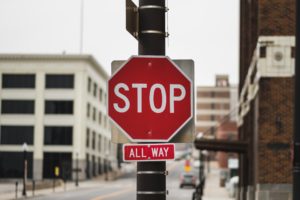
Last week Tim Fellows interviewed Martin Scott, a well-respected prophetic voice to the church across Europe, and his message was similar. God wants to use this time to press the RESET button. And for that to happen, we have to stop. Rest. Listen.
So maybe we need to remember that sometimes silence is golden. Resting in the presence of God is restorative and if you are feeling overwhelmed by the noise of fear or pressure or guilt right now, I challenge you to do something so simple and yet so revolutionary every day during this lockdown (and hopefully beyond).
Find a place in your home where you can be on your own.
Turn off your devices.
And pray.
And God will restore you. God will speak to you. God will comfort you. God will strengthen you to face any challenge that comes your way and perhaps reset the way you approach life moving forwards.
Related posts
 Let’s Respond to The Quiet Revival - Quiet Revival and the Next Generation You can watch Tim Alfords’ presentation on the changes we need to make to reach the next generation here: Watch on YouTube or Download the slides as a .zip The Bible Society’s phrase Quiet Revival names a sociological shift: churchgoing and Scripture engagement are rising after years of decline, […]
Let’s Respond to The Quiet Revival - Quiet Revival and the Next Generation You can watch Tim Alfords’ presentation on the changes we need to make to reach the next generation here: Watch on YouTube or Download the slides as a .zip The Bible Society’s phrase Quiet Revival names a sociological shift: churchgoing and Scripture engagement are rising after years of decline, […]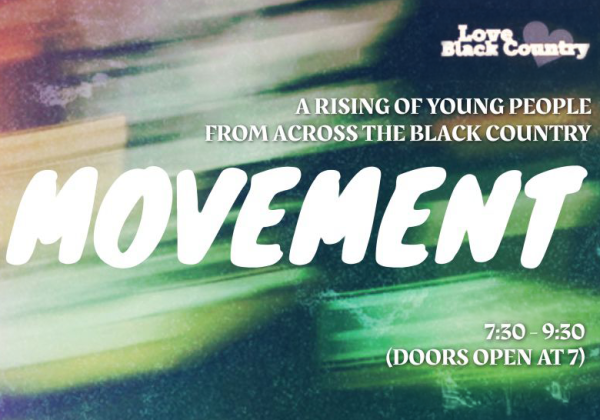 MOVEMENT – October 2025 - BOOK A SEAT IS ESSENTIAL: https://www.trybooking.com/uk/ENUL We’re back! After successfully gathering 300 young people in the last two gatherings, we’re keen to come together again. This is MOVEMENT, named by young people at Together Festival – a moment to worship, pray and gather the young people of our region. We are calling young people who love Jesus […]
MOVEMENT – October 2025 - BOOK A SEAT IS ESSENTIAL: https://www.trybooking.com/uk/ENUL We’re back! After successfully gathering 300 young people in the last two gatherings, we’re keen to come together again. This is MOVEMENT, named by young people at Together Festival – a moment to worship, pray and gather the young people of our region. We are calling young people who love Jesus […]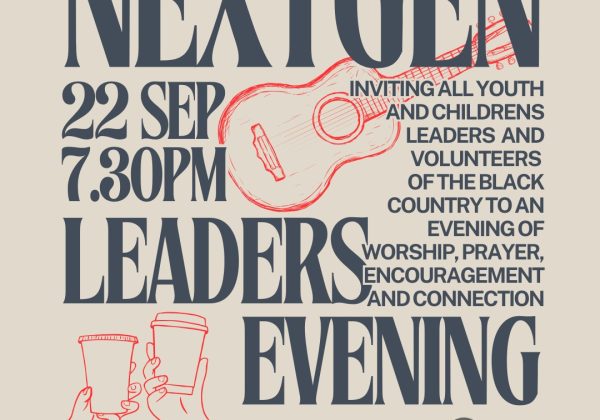 Next Gen Leaders’ Gathering - As part of our investment into the Next Generation, we continue to network and facilitate relational unity between kids and youth workers across the region. On Monday 22nd September, we are hosting a gathering for those involved with leading and working with children and young people in any capacity. We will pray, worship and share […]
Next Gen Leaders’ Gathering - As part of our investment into the Next Generation, we continue to network and facilitate relational unity between kids and youth workers across the region. On Monday 22nd September, we are hosting a gathering for those involved with leading and working with children and young people in any capacity. We will pray, worship and share […] Responding to the Quiet Revival - An Evening for Church Leadership Many of you will have seen the Sunday Express’s front page headlines published on the 27th July; ‘GLOBAL CRISIS SENDING GEN Z TO CHURCH’. The Express is one of many national news outlets reporting the spiritual shift taking place in our nation among Gen Z. The Bible Society report that […]
Responding to the Quiet Revival - An Evening for Church Leadership Many of you will have seen the Sunday Express’s front page headlines published on the 27th July; ‘GLOBAL CRISIS SENDING GEN Z TO CHURCH’. The Express is one of many national news outlets reporting the spiritual shift taking place in our nation among Gen Z. The Bible Society report that […] Next Gen Leaders’ Gathering - As part of our investment into the Next Generation, we continue to network and facilitate relational unity between kids and youth workers across the region. On Monday 2nd June, we are hosting a gathering for those involved with leading and working with children and young people in any capacity. We will pray, worship and share […]
Next Gen Leaders’ Gathering - As part of our investment into the Next Generation, we continue to network and facilitate relational unity between kids and youth workers across the region. On Monday 2nd June, we are hosting a gathering for those involved with leading and working with children and young people in any capacity. We will pray, worship and share […]